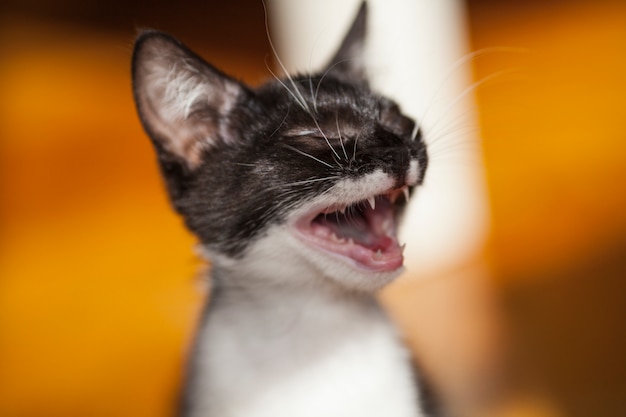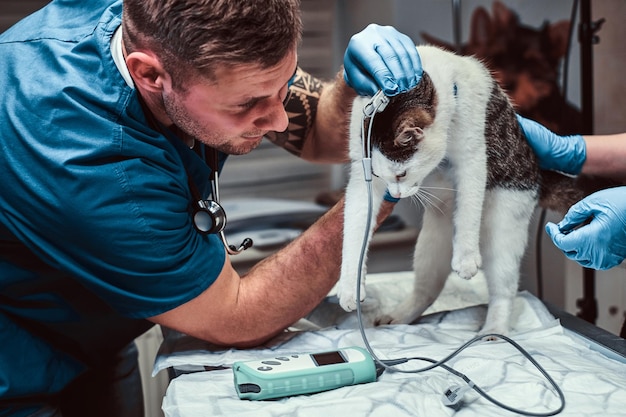Signs Your Pet Needs a Veterinary Dental Specialist


Signs Your Pet Needs a Veterinary Dental Specialist
Every pet owner wants the best for their companion, and that includes a healthy, pain-free mouth. However, oral health issues in pets often go unnoticed until they become severe. If your dog or cat is showing signs like persistent bad breath, trouble eating, or even facial swelling, these may be more than minor annoyances—they could be early symptoms of a serious dental problem that requires specialized attention. At Florida Veterinary Dental Services, located at 665 S Federal Hwy, Deerfield Beach, FL 33441, our veterinary dental specialists provide advanced care designed to address complex oral and maxillofacial conditions.
In this blog, you’ll learn how to recognize the pet oral health warning signs that mean it’s time to seek a referral to a veterinary dental specialist. We’ll explain why these issues occur, what treatments are available, and how to take proactive steps for your pet’s wellbeing. Whether you live in Deerfield Beach or surrounding communities, understanding when to see a pet dental specialist can make all the difference in your pet’s quality of life. If you’re searching for a "specialist vet near me" because of concerns about your pet’s mouth, this guide is for you.
Recognizing the Signs: When to See a Pet Dental Specialist
It can be difficult for pet owners to know when a dental problem requires more than a routine checkup. Many pets are experts at hiding pain, so subtle changes can easily go unnoticed. However, certain symptoms indicate that your pet may need more advanced dental care than what a general practice can provide.
Common warning signs to watch for are persistent bad breath that doesn’t improve after routine dental cleanings, difficulty chewing or dropping food, visible swelling of the face or jaw, and noticeable bleeding from the mouth. Additionally, pets may paw at their face, display reluctance to play with toys, or suddenly become withdrawn and irritable. Owners sometimes notice loose or missing teeth, visible masses or growths, or pus draining from the mouth or nose. In cats, chronic drooling or inflammation of the gums can point to conditions like feline gingivostomatitis, which require specialized treatment.
It’s also important to pay attention to subtle behavioral changes such as decreased appetite, weight loss, or a sudden aversion to dry food. Changes in breath odor—from slightly unpleasant to overwhelmingly foul—can signal deep-seated infections or oral tumors. In some cases, you may observe oral trauma from accidents or injuries, which can lead to broken teeth, jaw fractures, or lacerations inside the mouth. If your pet is experiencing any of these symptoms, it may be time to contact a "dental specialist veterinarian near me" for a comprehensive evaluation.
You can learn more about the value of early detection by exploring our pet examinations for dental wellness, which help identify oral health concerns before they escalate.
Understanding the Causes: Why Advanced Dental Problems Occur
Dental disease in pets is often the result of a combination of factors, including genetics, age, diet, underlying health conditions, and the natural buildup of plaque and tartar. Over time, untreated dental disease can progress from simple gingivitis to more severe conditions such as periodontal disease, tooth abscesses, or even bone loss.
Some breeds have a higher risk of dental problems due to the shape of their jaws or the way their teeth align. For example, small breed dogs and certain cats are more prone to developing severe periodontal disease at a younger age. Pets with immune-mediated conditions or chronic illnesses like diabetes may also have a greater risk.
Injuries and trauma present another set of challenges. Broken or fractured teeth can occur from chewing on hard objects, falls, or accidents. These injuries can expose the sensitive pulp of the tooth, leading to infection and significant pain. Similarly, oral tumors can develop in the gums, jaw, or facial tissues and may not be noticeable until swelling or bleeding occurs.
Other complex issues include oral malocclusions, where the teeth do not align properly, and congenital conditions such as cleft palate. These problems are rarely resolved with basic dental care and often require intervention from a veterinary dental specialist.
Environmental factors play a role as well. Florida’s humid climate can encourage the growth of certain bacteria, making regular dental hygiene especially important for pets in Deerfield Beach and surrounding areas. Understanding these causes can help pet owners recognize when to seek advanced dental care in Deerfield Beach for their companion animals.
Advanced Treatment Options from a Veterinary Dental Specialist
When your pet is referred to a veterinary dental specialist, you can expect access to diagnostic tools and treatments that go far beyond what is available at a general practice. Our team at Florida Veterinary Dental Services utilizes advanced imaging, such as digital dental radiography and CT scans, to accurately diagnose the cause and extent of your pet’s oral problem.
Treatment options depend on the diagnosis and may involve procedures such as complex dental extractions, root canal therapy, or surgical repair of jaw and facial fractures. For pets with oral tumors, specialized oral and facial tumor surgery is available to remove growths while preserving as much healthy tissue as possible. Conditions like severe periodontal disease may require periodontal surgery, while trauma cases may benefit from oral trauma management to restore both function and comfort.
Many pet owners are surprised to learn that restorative procedures—such as tooth restorations and crowns—and orthodontic management are available for companion animals. For cats with chronic oral inflammation, we offer chronic feline gingivostomatitis treatment, utilizing both medical and surgical therapies tailored to each case.
Our veterinary professionals are dedicated to providing oral pain management throughout the treatment process, ensuring your pet’s comfort at every stage. By working closely with your primary care veterinarian, we deliver individualized care plans and support a smooth recovery for your pet.
Home Care and Prevention: Supporting Your Pet’s Oral Health
While specialized dental care is essential for complex cases, prevention starts at home. Regular tooth brushing with pet-safe toothpaste, choosing dental-friendly diets, and providing appropriate chew toys can all help maintain your pet’s oral health between professional visits. It’s important to establish a routine that includes at-home inspections of your pet’s mouth; look for changes in gum color, unusual growths, or signs of discomfort.
Professional dental cleanings—performed under anesthesia by trained veterinary teams—are vital for removing tartar and addressing early signs of disease. In Deerfield Beach, pet owners have access to pet dental cleanings that support long-term oral health and allow for early intervention if problems are detected. Senior pets and those with a history of dental disease may need more frequent assessments and cleanings, which can be discussed during advanced dental care for seniors appointments.
Education is a powerful tool, and our Pet Owner Guide offers resources to help you recognize early warning signs and understand how to care for your pet’s teeth at home. By working together, we can reduce the risk of painful and costly dental problems.
When to Seek Professional Veterinary Dental Care
Deciding when to see a pet dental specialist can feel overwhelming, but timely intervention is critical for your pet’s comfort and future health. If your pet is displaying any of the pet oral health warning signs discussed earlier—such as persistent bad breath, difficulty eating, facial swelling, abnormal bleeding, or signs of oral pain—it’s time to reach out to your primary care veterinarian for a referral.
Certain situations require urgent attention. For example, if your pet has suffered oral trauma, has a broken tooth with visible pulp, or is experiencing sudden swelling or discharge from the mouth or nose, contact a "dental specialist veterinarian near me" as soon as possible. Emergency dental care is sometimes necessary to relieve pain and prevent life-threatening complications.
At Florida Veterinary Dental Services, we work closely with referring veterinarians to ensure your pet receives the highest standard of care for advanced dental issues. Our role as a specialist vet near me in Deerfield Beach is to provide expertise in diagnosing and treating oral conditions that go beyond the scope of general practice. If you’re unsure about your pet’s symptoms, a dental wellness exam can help clarify whether specialist intervention is needed.
For more information about the referral process, visit our dental referral page or reach out to our veterinary professionals for guidance.
Take the Next Step for Your Pet’s Oral Health
Your pet’s comfort and wellbeing are at the heart of everything we do at Florida Veterinary Dental Services. If you’ve noticed any pet oral health warning signs, or if your primary care veterinarian has recommended specialist evaluation, don’t wait to seek advanced dental care in Deerfield Beach. Our experienced team of veterinary dental professionals is here to answer your questions, provide comprehensive diagnostics, and create a treatment plan tailored to your pet’s unique needs.
If you are searching for a "specialist vet near me" or need expert dental care in Deerfield Beach and surrounding communities, we invite you to contact our clinic at (561) 529-1869 or visit us at 665 S Federal Hwy, Deerfield Beach, FL 33441. You can also explore our Pet Owner Guide for additional resources and information about when to see a pet dental specialist.
Your pet deserves a healthy, pain-free smile. Trust our dental specialist veterinarian near me to provide the advanced care your companion needs, and let us help you give your pet the best possible quality of life.
This blog is for informational purposes only and is not a substitute for professional veterinary care. If you have concerns about your pet’s oral health, please consult your primary care veterinarian or contact a veterinary dental specialist directly.

















